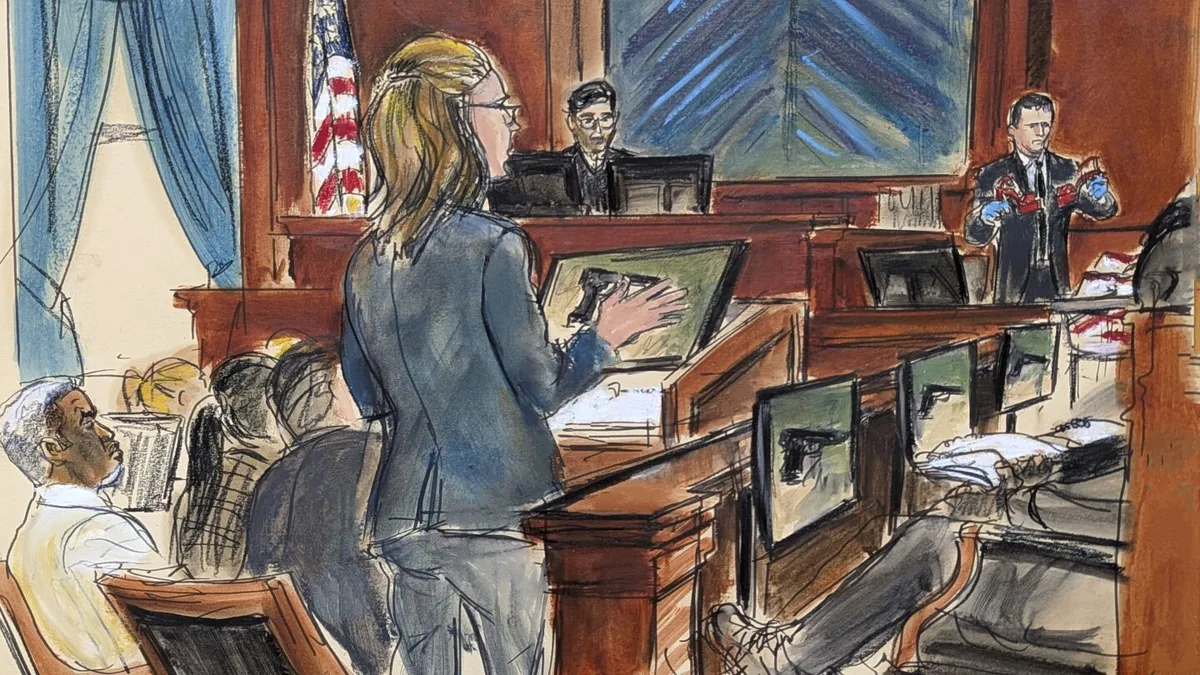
In a dramatic turn of events at the sex trafficking trial of Sean “Diddy” Combs, his former personal assistant, known in court only as “Mia,” testified about her traumatic experiences while working for the hip-hop mogul. During her testimony on Friday, Mia recounted a chilling moment when she felt compelled to throw her phone across the room in fear upon receiving a call from Combs just days after his ex-girlfriend, R&B singer Casandra “Cassie” Ventura, filed a lawsuit against him.
Mia described the emotional turmoil she experienced, stating, “It was just so triggering to see that.” She is one of three women expected to testify in this federal trial in Manhattan, revealing allegations of sexual abuse by Combs. Following his arrest in September, prosecutors have consistently denied bail for Combs, citing concerns that he and his co-conspirators attempted to contact potential victims and witnesses after Cassie's lawsuit was filed in November 2023. Notably, this lawsuit alleged years of sexual abuse and was settled for a staggering $20 million within a single day.
During a bail hearing, Assistant U.S. Attorney Emily Johnson stated that Combs had reached out to at least one victim in November 2023 and maintained contact with witnesses up until July. Mia shared her initial feelings of excitement when she received a call from D-Roc, one of Combs' former bodyguards, only to feel a wave of terror upon realizing he was at Combs’ residence trying to reconnect her with her employer. “I felt terrified, threatened, scared, nervous,” she recalled, explaining that she felt the need to devise a plan to protect herself.
When Mia recognized that Combs himself was attempting to call her, she acted impulsively, stating, “I threw my phone as far as it would go behind the couch, and I ran outside.” Her testimony paints a vivid picture of the fear and anxiety she endured while working for Combs.
In the subsequent cross-examination, Combs’ attorney, Brian Steel, challenged Mia’s credibility by referencing social media posts she made about Combs and Cassie. For instance, he highlighted a post from November 2013, Combs’ birthday, where she expressed gratitude for him as a mentor, saying, “Thank you for always letting me give birth to my dreams.” Steel provocatively asked, “Here, you have posted on your personal account your rapist delivering the baby?”
Earlier in her testimony, Mia disclosed that she was raped by Combs while sleeping in a bunk bed at his Los Angeles home shortly after he forcibly kissed her at his 40th birthday party in 2009. She explained that the assaults occurred sporadically but were frequent enough to leave her in a constant state of dread, believing each incident might be the last.
Combs, now 55 years old, has pleaded not guilty to serious charges, including sex trafficking and racketeering conspiracy, which could lead to a prison sentence ranging from 15 years to life if he is convicted. Mia, who worked for Combs from 2009 to 2017, described her time at Bad Boy Entertainment as a mix of exhilarating highs and devastating lows. After leaving the company, she received a $250,000 settlement out of a promised $400,000 but did not disclose the sexual abuse to her legal representatives at the time.
Despite her traumatic experiences, Mia indicated that she maintained a facade of normalcy in her interactions with Combs and her co-workers, referring to them as “family” and expressing feelings of “love” even after the assaults. She explained, “That’s how we all talked to each other.” Mia also mentioned that she had difficulties adjusting to life after her employment with Combs, as she has been unable to work due to post-traumatic stress disorder.
Mia revealed that her trauma has affected her perception of everyday situations. For instance, she would misinterpret innocent emails asking “where are you?” as reprimanding. Additionally, hearing someone call her name from across the room would trigger her alarm, regardless of the context. Throughout the cross-examination, Steel repeatedly questioned her motives behind promoting Combs, asking, “Why would you promote the person who has stolen your happiness in life?”
Mia defended her actions, stating that her social media posts were often a facade intended to showcase a perfect life, even if it wasn’t reflective of her reality. She concluded by emphasizing the disconnect between her public persona and her private suffering, saying, “Of course you post great times.”